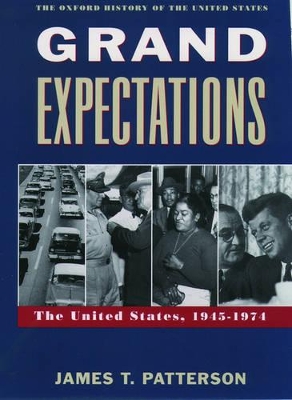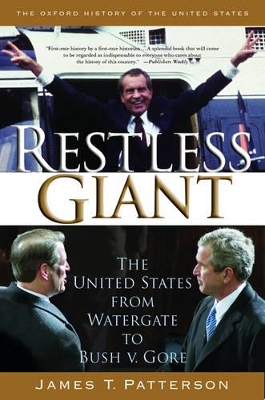Oxford History of the United States
2 primary works
X
Beginning in 1945, America rocketed through a quarter-century of extraordinary economic growth, experiencing an amazing boom that soared to unimaginable heights in the 1960s. At one point, in the late 1940s, American workers produced 57 percent of the planet's steel, 62 percent of the oil, 80 percent of the automobiles. The U.S. then had three-fourths of the world's gold supplies. English Prime Minister Edward Heath later said that the United States in the post-War
era enjoyed "the greatest prosperity the world has ever known." It was a boom that produced a national euphoria, a buoyant time of grand expectations and an unprecedented faith in our government, in our leaders, and in the American dream—an optimistic spirit which would be shaken by events in the
'60s and '70s, and particularly by the Vietnam War.
Now, in Grand Expectations, James T. Patterson has written a highly readable and balanced work that weaves the major political, cultural, and economic events of the period into a superb portrait of America from 1945 through Watergate. Here is an era teeming with memorable events—from the bloody campaigns in Korea and the bitterness surrounding McCarthyism to the assassinations of the Kennedys and Martin Luther King, to the Vietnam War, Watergate, and Nixon's resignation.
Patterson excels at portraying the amazing growth after World War II—the great building boom epitomized by Levittown (the largest such development in history) and the baby boom (which exploded literally nine months after V-J Day)—as well as the resultant buoyancy of spirit reflected in everything from streamlined
toasters, to big, flashy cars, to the soaring, butterfly roof of TWA's airline terminal in New York. And he shows how this upbeat, can-do mood spurred grander and grander expectations as the era progressed.
Of course, not all Americans shared in this economic growth, and an important thread running through the book is an informed and gripping depiction of the civil rights movement—from the electrifying Brown v. Board of Education decision, to the violent confrontations in Little Rock, Birmingham, and Selma, to the landmark civil rights acts of 1964 and 1965. Patterson also shows how the Vietnam War—which provoked LBJ's growing credibility gap, vast defense spending that dangerously
unsettled the economy, and increasingly angry protests—and a growing rights revolution (including demands by women, Hispanics, the poor, Native Americans, and gays) triggered a backlash that widened hidden rifts in our society, rifts that divided along racial, class, and generational lines. And by Nixon's
resignation, we find a national mood in stark contrast to the grand expectations of ten years earlier, one in which faith in our leaders and in the attainability of the American dream was becoming shaken.
Grand Expectations is the newest volume in the prestigious Oxford History of the United States. The earlier releases were highly acclaimed, and one, Battle Cry of Freedom, was both a New York Times bestseller and a winner of the Pulitzer Prize. Patterson's volume takes its rightful place beside these distinguished works. It is a brilliant summation of the years that created the America that we know today, a time of setbacks amid unmatched and lasting
achievements.
era enjoyed "the greatest prosperity the world has ever known." It was a boom that produced a national euphoria, a buoyant time of grand expectations and an unprecedented faith in our government, in our leaders, and in the American dream—an optimistic spirit which would be shaken by events in the
'60s and '70s, and particularly by the Vietnam War.
Now, in Grand Expectations, James T. Patterson has written a highly readable and balanced work that weaves the major political, cultural, and economic events of the period into a superb portrait of America from 1945 through Watergate. Here is an era teeming with memorable events—from the bloody campaigns in Korea and the bitterness surrounding McCarthyism to the assassinations of the Kennedys and Martin Luther King, to the Vietnam War, Watergate, and Nixon's resignation.
Patterson excels at portraying the amazing growth after World War II—the great building boom epitomized by Levittown (the largest such development in history) and the baby boom (which exploded literally nine months after V-J Day)—as well as the resultant buoyancy of spirit reflected in everything from streamlined
toasters, to big, flashy cars, to the soaring, butterfly roof of TWA's airline terminal in New York. And he shows how this upbeat, can-do mood spurred grander and grander expectations as the era progressed.
Of course, not all Americans shared in this economic growth, and an important thread running through the book is an informed and gripping depiction of the civil rights movement—from the electrifying Brown v. Board of Education decision, to the violent confrontations in Little Rock, Birmingham, and Selma, to the landmark civil rights acts of 1964 and 1965. Patterson also shows how the Vietnam War—which provoked LBJ's growing credibility gap, vast defense spending that dangerously
unsettled the economy, and increasingly angry protests—and a growing rights revolution (including demands by women, Hispanics, the poor, Native Americans, and gays) triggered a backlash that widened hidden rifts in our society, rifts that divided along racial, class, and generational lines. And by Nixon's
resignation, we find a national mood in stark contrast to the grand expectations of ten years earlier, one in which faith in our leaders and in the attainability of the American dream was becoming shaken.
Grand Expectations is the newest volume in the prestigious Oxford History of the United States. The earlier releases were highly acclaimed, and one, Battle Cry of Freedom, was both a New York Times bestseller and a winner of the Pulitzer Prize. Patterson's volume takes its rightful place beside these distinguished works. It is a brilliant summation of the years that created the America that we know today, a time of setbacks amid unmatched and lasting
achievements.
Vol. 11
James Patterson's Bancroft Prize-winning Grand Expectations, the penultimate volume in the Oxford History of the United States, was hailed by The New York Times as "a spirited, sprawling narrative of American life" and by The Wall Street Journal as "a tour de force." Now, in the final chronological volume of this acclaimed series, Patterson again offers an authoritative and vibrant history of a turbulent period in American life.
Restless Giant provides a crisp, concise assessment of the twenty-seven years between the resignation of Richard Nixon and the election of George W. Bush, in a sweeping narrative that seamlessly weaves together social, cultural, political, economic, and international developments. We meet the era's many memorable figures—most notably, Ronald Reagan and Bill Clinton—and explore the "culture wars" where liberals and conservatives, including a resurgent Religious Right, appeared
to cut the country in two. Indeed, Reagan helped to usher in a widespread conservative revolution, but even as the Right was ascendant politically, it did not succeed in reversing more liberal trends. Patterson describes how, when the Cold War finally ended, Americans faced bewildering new developments
around the world and discovered—in Panama, Somalia, Bosnia, and Iraq—that it was far from easy to direct the outcome of global events. In exploring a wide range of cultural, social, and economic concerns, Patterson shows how the persistence of racial tensions, high divorce rates, alarm over crime, and urban decay all led many writers to portray this era as one of decline. But Restless Giant offers a more positive perspective, arguing that our often unmet expectations caused many of
us to view the era negatively, when in fact we were in many ways better off than we thought. By 2000, most Americans lived more comfortably than they had in the 1970s, and though bigotry and discrimination were far from extinct, a powerful rights consciousness insured that these were less pervasive in American
life than at any time in the past.
With insightful analyses and engaging prose, Restless Giant captures this period of American history in a way that no other book has, illuminating the road that the United States traveled from the dismal days of the mid-1970s through the hotly contested election of 2000.
Restless Giant provides a crisp, concise assessment of the twenty-seven years between the resignation of Richard Nixon and the election of George W. Bush, in a sweeping narrative that seamlessly weaves together social, cultural, political, economic, and international developments. We meet the era's many memorable figures—most notably, Ronald Reagan and Bill Clinton—and explore the "culture wars" where liberals and conservatives, including a resurgent Religious Right, appeared
to cut the country in two. Indeed, Reagan helped to usher in a widespread conservative revolution, but even as the Right was ascendant politically, it did not succeed in reversing more liberal trends. Patterson describes how, when the Cold War finally ended, Americans faced bewildering new developments
around the world and discovered—in Panama, Somalia, Bosnia, and Iraq—that it was far from easy to direct the outcome of global events. In exploring a wide range of cultural, social, and economic concerns, Patterson shows how the persistence of racial tensions, high divorce rates, alarm over crime, and urban decay all led many writers to portray this era as one of decline. But Restless Giant offers a more positive perspective, arguing that our often unmet expectations caused many of
us to view the era negatively, when in fact we were in many ways better off than we thought. By 2000, most Americans lived more comfortably than they had in the 1970s, and though bigotry and discrimination were far from extinct, a powerful rights consciousness insured that these were less pervasive in American
life than at any time in the past.
With insightful analyses and engaging prose, Restless Giant captures this period of American history in a way that no other book has, illuminating the road that the United States traveled from the dismal days of the mid-1970s through the hotly contested election of 2000.

